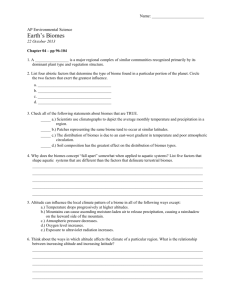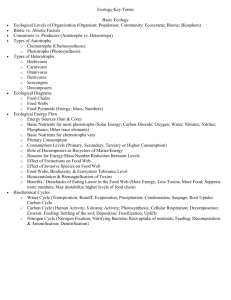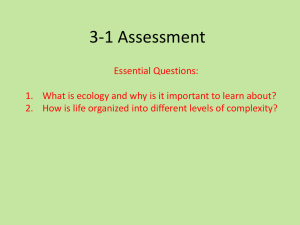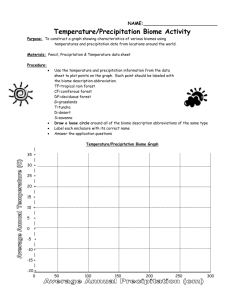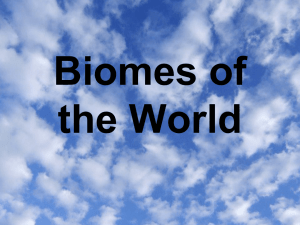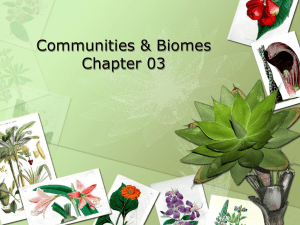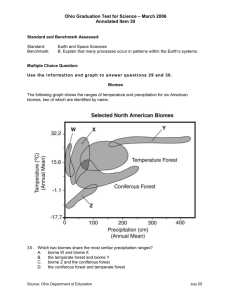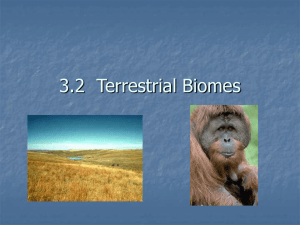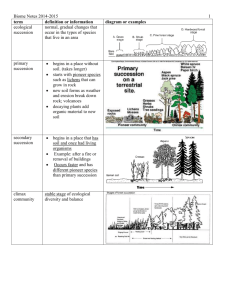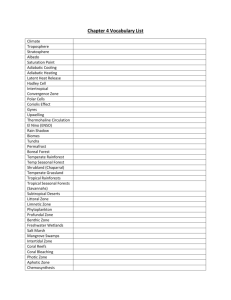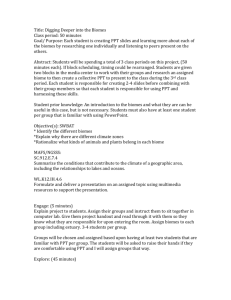4th_Quarter_Review
advertisement
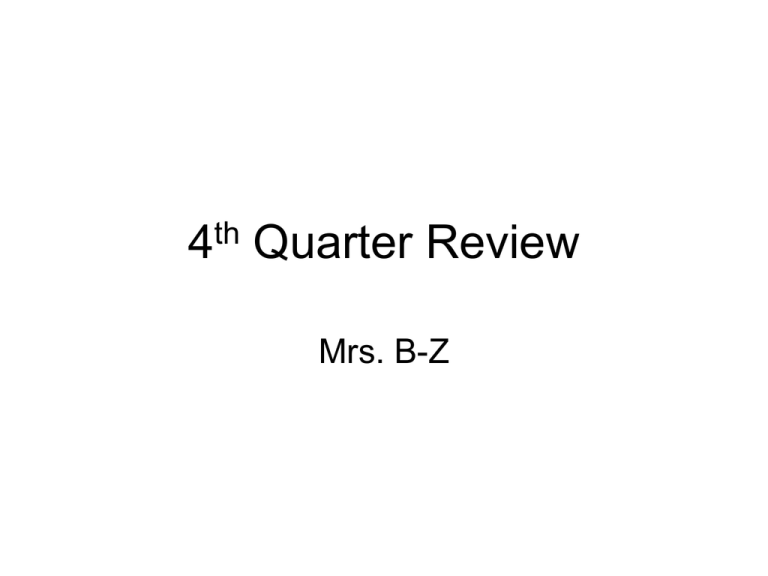
4th Quarter Review Mrs. B-Z Many people who raise chickens and other small farm animals consider coyotes to be pests. These people have decreased the coyote population in many parts of the United States. Which of these is likely a result of the decrease in the number of coyotes in the area? A. The mouse population has increased. B. The hawk population has decreased. C. The grass population has increased. D. The goat population has decreased. 4. Deserts are consistently the driest biomes in North America. They typically receive very little precipitation but have a wide variation in the mean annual temperature. Which biome likely represents the deserts? A. W B. X C. Y D. Z 5. Based on the graph, what is the primary difference between biomes W and X? A. mean number of species B. mean annual temperature C. mean annual precipitation D. mean number of days with sunshine Biome Z would likely be found in which of these locations? A. in a valley along the Pacific coast B. along a rocky shore in New England C. in the middle of the Midwestern plains D. above the tree line in the Rocky Mountains Locate biome W and the temperate forest on the graph. Based on the information provided, describe one similarity and one difference between the climates of these two biomes. Respond in the space provided in your Answer Document. (2 points) Rate this answer 0, 1, or 2 • There are both similarities and differences between biome W and the temperate forest. According to the graph, there is a similarity between the two as well as a difference. Rate this answer 0, 1, 2 • Temperate forests have many trees whereas biome W may not have as many trees. Prewriting Thinking Similarity Difference Biome W Mean annual temperature spans from about 100C to about 250C Annual precipitation is between 0-35 cm Temperate Forest Mean annual temperature span is from about 120C to about 250C Annual precipitation is between 50-225 cm Upgrade your answer to a 2 point answer! • According to the graph, the annual mean temperature of both biome W and the temperate forest are similar from about 100C to about 250C. However, the annual precipitation of biome W is only 0 – 35 cm; whereas the temperate forest has considerably more annual precipitation at 50-225 cm. The tundra is the coldest of the biomes, having extremely low temperatures and little precipitation. What other characteristics would be expected for this biome? • A. low biotic diversity and sparse vegetation B. nutrient rich soil and a long growing season C. stable population numbers and high biotic diversity D. dense vegetation and large daily temperature fluctuations What type of energy from the oceans is responsible for weather patterns? • • • • A. electrical B. magnetic C. mechanical D. thermal When examining the red shift of galaxies outside our own, every galaxy appears to be moving away from the observer. This observation supports the Big Bang Theory because it indicates that • • • • A. our galaxy is not moving. B. the universe is expanding. C. most galaxies have the same mass. D. Earth is at the center of the universe. Our solar system is thought to have formed from a nebula of dust and gas. Most of this nebula condensed to form the sun. What is primarily responsible for causing these materials to condense? • A. electrical attraction between charged dust particles • B. gravitational pull of nebula materials on each other • C. heat released by nuclear fusion at the center of the nebula • D. chemical reactions between hydrogen and other nebula gases Hydroelectric power is considered a “clean” energy source because it • A. is available in most areas. • B. increases the amount of power available. • C. does not produce the pollutants that burning fossil fuels do. • D. requires minimal investment in equipment. Artificial light at night can negatively impact wildlife. Which outdoor light design minimizes the effect of the light on wildlife? The following diagram shows a cross-section of the mid-Atlantic Ridge. Which area is likely the oldest crust? A. 1 B. 2 C. 3 D. 4 Which property of a star can be determined most directly from its color? • • • • A. mass B. diameter C. precise age D. surface temperature The diagram below illustrates the relationships in a forest food web. • Based on this diagram, an ecologist would most likely conclude that a decrease in the fox population would result in • A. an increase in the owl population. • B. a decrease in the rabbit population. • C. a decrease in the chipmunk population. • D. an increase in the grasshopper population. Identify two savings that result from recycling aluminum cans and explain one ecological benefit of each. (4 points) Ecological Benefit Recycling Cans Savings 2 Savings 1 Sample Answers • Savings: • 1.Energy required to mine raw materials • 2. Energy required to transport raw materials • Ecological Benefit • Saving nonrenewable fossil fuels Sample Answer • Savings • 1. Nonrenewable raw materials (natural resources) conserved • 2. Materials reused • Ecological Benefit • Less mining which disturbs ecosystem and causes localized degradation. Sample Answer • Savings: • 1. Energy and associated costs of litter collection of discarded cans would be saved. • 2. Landfill space and fuel for landfill maintenance is saved • Ecological Benefit • Reduced landfill is less impact on the local environment for landfill space and chemicals leaching into the ground water. In Aristotle’s treatise On Meteorology, he stated that: “The same parts of the Earth are not always moist or dry, but they change accordingly as rivers come into existence and dry up. And so the relation of land to sea changes too and a place does not always remain land or sea throughout all time, but where there was dry land there comes to be sea, and where there is now sea, there one day comes to be dry land. …” Aristotle was referring to the • • • • A. depletion of natural resources. B. cyclic nature of Earth processes. C. relationship between latitude and climate. D. effects of humans on biogeochemical cycles What evidence has been used to support the theory of plate tectonics? • A. The Grand Canyon runs in the same direction as the mid-Atlantic ridge. • B. There are deserts in the western parts of North and South America. • C. The same fossil species are found in South America and Africa. • D. Glacial till covers parts of the northern United States and Asia.
